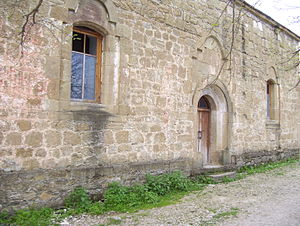Talish, Tartar
Talish
Թալիշ | |
|---|---|
| Talış | |
 The Holy Savior Church in the village, built in 1894. | |
| Coordinates: 40°22′53″N 46°44′27″E / 40.38139°N 46.74083°E | |
| Country | |
| District | Aghdara |
| Population (2023)[1] | |
• Total | 90 |
| Time zone | UTC+4 (AZT) |
Talish (Azerbaijani: Talış, ; Armenian: Թալիշ) is a village in the Aghdara District in Azerbaijan, in the disputed region of Nagorno-Karabakh. The village had an ethnic Armenian-majority population prior to the 2020 Nagorno-Karabakh war, and also had an Armenian majority in 1989.[2]
History
[edit]During the Soviet period, the village was part of the Mardakert District of the Nagorno-Karabakh Autonomous Oblast. During the course of the Nagorno-Karabakh conflict, the side controlling the village has changed on numerous occasions. During the First Nagorno-Karabakh War, the village last changed hands when the village was recaptured by Armenian forces from the Azerbaijani side on 11 April 1994. After the war, the village was administrated as part of the Martakert Province of the breakaway Republic of Artsakh.[3]
During the 2016 Armenian-Azerbaijani clashes, the village was severely damaged and was temporarily captured by Azerbaijani forces after most of its population had been evacuated, but was recaptured by Armenian forces before the end of the clashes.[4][5][6][7] After the village was recaptured, an elderly Armenian couple was found executed in their home with their ears cut off.[8][9] The village was captured by Azerbaijan during the 2020 Nagorno-Karabakh war.[10][11][12] Resettlement of the village by Azerbaijanis began in March 2023, with 20 families moving back to Talish.[13]
Historical heritage sites
[edit]Historical heritage sites in and around the village include an Armenian church built in 1151, a 12th/13th-century khachkar, the monastery of Horeka (Armenian: Հոռեկա վանք, romanized: Horeka Vank, also known as the monastery of Glkho, Գլխո) built in 1279–1284, the 13th-century village of Dyutakan (Դյութական), a 17th-century Armenian church, a cemetery from between the 17th and 19th centuries, the manor house of the Melik-Beglaryans (Armenian: Մելիք-Բեգլարյանների ապարանք, romanized: Melik-Beglaryanneri Aparank) built in 1727, a 19th-century spring monument,[14] and the church of Surb Amenaprkich (Armenian: Սուրբ Ամենափրկիչ, lit. 'Holy Savior') built in 1894.[15]
Demographics
[edit]In 1897, the village had a population of 1,155 consisting of 623 men and 532 women, 1,148 or 99.4 percent of whom were Armenian Apostolic.[16]: 32
The village had 581 inhabitants in 2005,[17] and 597 inhabitants in 2015.[14]
On 16 March 2023, 20 Azerbaijani families (90 people) resettled in village.[1] According to the program, 158 families are expected to be relocated to the village.[18]
Gallery
[edit]-
Horeka Monastery, a 13th-century monastic complex near the village
References
[edit]- ^ a b Report.az (16 March 2023). "Azerbaijan's first former IDPs return to liberated Talish village". Archived from the original on 16 March 2023. Retrieved 16 March 2023.
- ^ Андрей Зубов. "Андрей Зубов. Карабах: Мир и Война". drugoivzgliad.com. Archived from the original on 2022-09-24.
- ^ Brzezinski, Zbigniew; Brzezinski, Zbigniew K.; Sullivan, Paige (October 23, 1997). Russia and the Commonwealth of Independent States: Documents, Data, and Analysis. M.E. Sharpe. ISBN 9781563246371 – via Google Books.
- ^ "Azerbaijani Soldiers Execute Elderly Armenian Couple in Artsakh; Then Cut Off Their Ears". HETQ.am. 3 April 2016. Retrieved 3 April 2016.
- ^ [1][dead link]
- ^ "Azerbaijan's Incremental Increase On The Nagorno Karabagh Frontline". bellingcat. April 12, 2016.
- ^ "Artsrun Hovhannisyan: Armenian troops liberate new positions and frontiers in Karabakh". armenpress.am.
- ^ "Azerbaijani Soldiers Execute Elderly Armenian Couple in Artsakh; Then Cut Off Their Ears". Hetq.am. 3 April 2016. Retrieved 2023-01-13.
- ^ "A year after the war in Nagorno Karabakh's frontline village of Talish".
- ^ "Azerbaijan liberates 7 more villages amid clashes". Anadolu Agency.
- ^ "Hadrut and Talish under full control of Armenian forces". Public Radio of Armenia. Retrieved 2020-10-16.
- ^ "Azerbaijan's Defense Ministry releases footages of liberated from occupation Talish village". Azertag.
- ^ "Azerbaijan launches multi-day tours of Shusha | Eurasianet".
- ^ a b Hakob Ghahramanyan. "Directory of socio-economic characteristics of NKR administrative-territorial units (2015)".
- ^ Kiesling, Brady; Kojian, Raffi (2019). Rediscovering Armenia: An in-depth inventory of villages and monuments in Armenia and Artsakh (3rd ed.). Armeniapedia Publishing.
- ^ Troynitsky, N. A. (1905). Населенные места Российской империи в 500 и более жителей с указанием всего наличного в них населения и числа жителей преобладающих вероисповеданий, по данным первой всеобщей переписи населения 1897 г. [Populated areas of the Russian Empire with 500 or more inhabitants, indicating the total population in them and the number of inhabitants of the predominant religions, according to the first general population census of 1897] (in Russian). Saint Petersburg: Tipografiya Obshchestvennaya polza. Archived from the original on 10 August 2022.
- ^ "The Results of the 2005 Census of the Nagorno-Karabakh Republic" (PDF). National Statistic Service of the Republic of Artsakh.
- ^ APA.az. "President's Special Representative: 158 more families to be relocated in Talish village of Azerbaijan". Apa.az. Archived from the original on 16 March 2023. Retrieved 16 March 2023.





